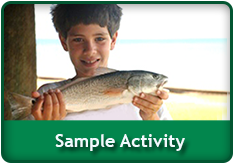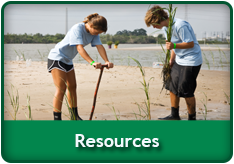Project WILD is an interdisciplinary conservation and environmental education program that focuses on wildlife and habitat. The goal of Project WILD is to develop awareness, knowledge, skills, and commitment resulting in informed decisions, responsible behavior, and constructive actions concerning wildlife and the environment. Contact your Project WILD State Coordinator today!
- Field Investigation Activities
- In Step with STEM Activity Extensions
- WILD Work Career Connections
- Outdoor Components
Contact your state coordinator to schedule a workshop near you!
Since Project WILD was introduced in 1983, more than 1.5 million educators in the United States have participated in Project WILD and Aquatic WILD workshops. Those educators, in turn, have reached over 100 million youth since the program was first introduced. This success, which has made Project WILD one of the largest wildlife education programs in the world, is possible only through the enthusiastic support of Project WILD's extensive and talented network of Project WILD sponsors, coordinators, and facilitators.
What's new for Project WILD? Ongoing updates to the curriculum guide are built upon changing wildlife conservation needs and management practices, as well as advances in instructional methodology in Pre-K through 12th grade education. Our 4th edition features the following:
- Field Investigation Activities - Research environmental topics or issues in local areas by implementing outdoor field investigations. Through new and expanded activities, students learn methods and protocol for conducting scientific investigations, including how to formulate a research question, choosing a viable study site, engaging in systematic data collection and analysis, and applying field ethics.
- "In Step with STEM" Activity Extensions - This component guides students through deeper investigations and uses a variety of tools as part of their problem-solving efforts.
- "WILD Work" - A career component has been added to all activities to tie in real occupations in the fields of wildlife management and conservation with every lesson.
- Outdoor Components - We are getting students outside with every activity!
Project WILD is based on educational standards, developed by scientists, and reviewed and field-tested by educators. We strive to prepare highly qualified teachers through effective professional development. To receive a Project WILD guide, you must attend a workshop offered by one of our highly trained coordinators or facilitators. Please click here to find out how to receive professional development in your area.
Guide Resources
Table of Contents
The North American Model of Wildlife Conservation
Appendix
Acknowledgements
Early Childhood Classrooms
Grade Level Index
Skills Index
Topic Index
Unit Planning Suggestions
Expanded Topic Index
Using Simulations for Instructional Purposes
Evaluating and Assessing Student Learning
Inventory Methods: For Plants and Wildlife on School or Community Grounds
Service Learning
Using Local Resources
Field Ethics
Animals in the Classroom
Effective Climate Change Education
The Ecosystem Concept and Project WILD
Glossary
What's My Question?
Conclusions and Next Steps
Data Collection Form
Metric Conversion Chart
Get More WILD! Additional Project WILD Resources from AFWA
Alphabetical Listing of Activities



